Chinese car manufacturers are speeding up their plans to enter new European markets as they aim to win business in countries where electrification of transport is under way.
In China's fiercely competitive market, with over 200 car and van makers vying for the top spot, new players like Xiaomi, a major smartphone maker, are entering the electric vehicle market.
Chinese brands see mainland Europe and the UK as crucial growth opportunities. Zhang Yong, vice president of Hozon subsidiary Neta Auto, stated: “China's market is tough. We have good cars at good prices, but to stay afloat, we need to go global.”
Chinese car manufacturers are speeding up their plans to enter new European markets as they aim to win business in countries where electrification of transport is under way.
In China's fiercely competitive market, with over 200 car and van makers vying for the top spot, new players like Xiaomi, a major smartphone maker, are entering the electric vehicle market.
Chinese brands see mainland Europe and the UK as crucial growth opportunities. Zhang Yong, vice president of Hozon subsidiary Neta Auto, stated: “China's market is tough. We have good cars at good prices, but to stay afloat, we need to go global.”
Brands like BYD, GWM (Great Wall), and Omoda (owned by Chery) have recently entered the UK market, following the success of MG and Maxus, both owned by SAIC.
Others like Neta Auto, New Gonow, JAC, and the Geely/Baidu joint venture Jidu are also planning their entry into key global markets, including the UK, where they are preparing to meet homologation requirements and sell right-hand drive models, writes AM group editor Stephen Briers.
JAC
Hefei-based JAC, which has one of the broadest ranges of cars, vans and trucks in the Chinese market, intends to make its mark in the UK with a hybrid approach, selling products under its own brand and in partnership with another existing manufacturer.
Although the full launch timetable is yet to be confirmed, according to Nancy Cao, director, Europe region at JAC International, the manufacturer intends to eventually bring a full range of cars, vans and trucks to the UK.
“We plan to introduce trucks and cars to Europe and the UK, focused on new energy vehicles (electric)," Cao said. "There is potential for us in the UK.”
This year it will launch a right-hand drive 7.5-tonne LDT electric truck later this year, rebranded and sold under agreement with an unnamed UK-based manufacturer. But it will also bring a right-hand drive four-wheel drive electric T8 pick-up which will be sold under the JAC brand via its own network of dealers.
Both are "ready for UK homologation", according to Vincent Xie, JAC sales manager for Europe.
[gallery id=1921]
JAC, which is celebrating its 60th year, sold 590,000 units in China last year and already exports to several global markets, including France, Italy and Spain, with volumes reaching 246,679 in 2023.
However, JAC, like many of its peers, has concerns about the European Union's investigation into alleged anti-competition subsidies which could result in new tariffs being applied to vehicles imported from China.
Leo Zeng, assistant to the president of JAC International said: “We are surprised by the anti-subsidy investigation because vehicles with the Europe brand have more than four million sales in China, but the vehicles with the China brand only sell around 300,000 in the European market. There is no concrete proof for the subsidies that have been accused.
“The Chinese support is the same support that Europe make for European brands - it's equal; but it's only the China brands that have been accused of subsidies and support.”
He added: “The UK market is different to Europe, which is good news for us - it welcomes Chinese electric vehicles.”
It has recently announced a new electric modular platform Matrix featuring a honeycomb battery design which will accommodate a small saloon and SUV, large saloon and SUV and a people carrier.
Neta Auto
Most Chinese manufacturers intend to retain full control over their brands as they globalise, by setting up their own national sales companies and employing people with local knowledge. Some have also indicated their desire to acquire or build assembly plants and design centres in Europe.
Neta Auto will open an engineering/technology centre in Germany and design centre in Turin, Italy, and has earmarked four electric models for initial launch to Europe and the UK. It has already established a sales subsidiary in Netherlands.
The company, which employs 9,000 people and claims to have 3,000-plus patents for its technology, will have capacity to assemble 500,000 vehicles next year.
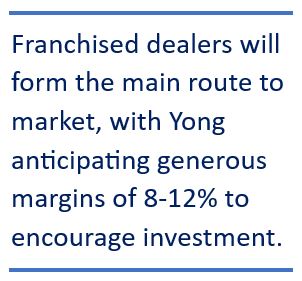 The X mid-size SUV and Aya compact SUV (in two battery specs offering 300km and 400km range - 186 and 248 miles respectively) are already available in right-hand drive and are most immediately suited to the UK but have yet to go through homologation.
The X mid-size SUV and Aya compact SUV (in two battery specs offering 300km and 400km range - 186 and 248 miles respectively) are already available in right-hand drive and are most immediately suited to the UK but have yet to go through homologation.
The GT and new L SUV (more than 500km/310 miles BEV range and 1,300km/808 miles PHEV) will also be produced in right-hand drive in 2025. The S sports coupe will be launched in China in July, taking the full range to six cars (the full-size U SUV completes the list).
Neta sold 152,000 cars in China in 2022, making it the ninth largest manufacturer (and the biggest EV start up), although volumes dropped to 127,496 last year for 14th place. However, sales have recovered in 2024 and, so far, it is at number five with a more than 60% rise in registrations.
Its commitment is to build “cost-effective BEVs”, according to vice president and co-founder Zhang Yong, who is responsible for the global market. For example, the Aya is priced from $12,000 (£9,600) while the GT is $40,000 (£32,000) (pre-import taxes).
“We will launch a new model every year in the AO to A+ segments,” Yong said. “We can also reduce specification levels to reduce the price if needed in the UK.”
By 2026, Neta expects to be selling one million cars, including 300,000 overseas (many in the Asia-Pacific region). As well as next-generation battery technology (named Tiangong, it majors on safety, range, rapid charging - 300km/186 miles with a 10-minute charge - and lifespan), Neta is also investing heavily in intelligent technologies, including driving, cockpit and control to embody its vision of “tech for all”.
Meanwhile, its Yunhe EV global mainstream platform enables 80% parts sharing across saloon, SUV and MPV models, shortening the new model development cycle to just eight months.
Yong believes the European Commission will raise tariffs from the current 10% to 20-30%, but he is confident the company's pricing strategy will enable it to remain competitive.
This extends to aftersales, with Neta likely to have central parts warehouses for local distribution, to reduce shipping time and costs from China. It also owns the Hozi, which supplies parts for chassis, electric drive, thermal control and the intelligent seat to both Neta and other OEMs.
Franchised dealers will form the main route to market, with Yong anticipating generous margins of 8-12% to encourage investment.
Yong doesn't rule out selling cars under a different brand but is yet to begin the search for a UK partner.
He added: “We have the models for Europe, but we have to be well prepared. We have to create our brand and brand image.”
New Gonow
One of the biggest challenges facing UK fleets is the transition of light commercial vehicles to electric. Too few manufacturers with vans that are too expensive and offer insufficient range are stymying corporate aspirations to decarbonise.
Shanghai-based New Gonow believes it can provide the solution.
The company, which also makes caravans and recreation vehicles, has two electric van models in its range: a rear-wheel drive DM20 which is 4.8m in length with 5.7cu.m load volume and 950kg payload, priced from $19,000 (£15,200); and a front-wheel drive SY00, which is 5.4m in length with 7cu.m load volume and 1.1-tonne payload, priced from $22,500 (£18,000).
Range for the DM20 is 300km (186 miles); the SY00 is c230km - both from a 53kWh battery made by CATL which can be rapid-charged from 20-80% in 45 minutes. Although currently available only in left-hand drive, New Gonow plans to start building RHD in 2025/26.
Safety features include ABS, ESP, traction control, hill start assist and brake assist, and reversing camera, while an integrated heat pump helps to improve battery efficiency. Suspension is MacPherson front/leaf spring rear.
Faried Zhao, New Gonow head of international relations, said: “We want to establish relationships with foreign countries. The first step is to find reliable partners that understand the local market - we are looking for a suitable partner for the UK.
“China is very competitive, and we want to look global.”
Mike Lin, CEO, Zondar China Energy & Technology, is working on plans to bring one the New Gonow vans to the UK in Q4 this year, as part of a duo of launches.
The second is a Transit-sized (1980 height/5490mm length) light commercial vehicle from Geely. Both will trade under a new yet-to-be-announced brand.
Lin is looking for dealers to support the launch plan.
Jidu
A joint venture partnership between Geely (parent of Volvo, Polestar and LEVC) and China's biggest search engine Baidu has resulted in new autonomous electric vehicle car company Jidu.
Within just three years of inception, the company launched its first Level 4 autonomous-capable car, the Jiyue Robo 01 (November 2023), and it now plans to launch a new car each year for the next three years.
At the 2024 Beijing Motor Show, Jidu unveiled the Jiyue 07 saloon which will be on sale in China by the end of the year. Cars are also slated for 2025 and 2026 - all with full autonomous capability.
Jidu designs the cars and battery, and creates the software and technology, but the cars are manufactured by Geely.
All vehicle functions are voice controlled, which Jidu believes is easier than using switches when the car is in autopilot. The hands-free system (although hands by law must remain on the steering wheel) can be used on 90% of main roads in China, with the remainder comng on board this year.
Testing is underway in 100 city centres, including Beijing and Shanghai, with more than 300 set to be part of the pilot project by the end of the year.
Jidu intends to begin global expansion in the second half of 2024 with right-hand drive models in the roadmap for 2026.
Andy Gao, Jidu head of sales, said: “The market in China is very competitive compared to Europe - we have so many brands here. That means pricing has to be competitive. From the beginning of the company we were targeting an international brand and we see 50-50 China-to-international sales.”
Jidu head of international business Jia Chen added: “Local markets rely on local people, so we need the right coordinators to help our expansion. We also understand the need to have the whole ecosystem, inclding aftersales and logistics.”
Similar to Tesla, Jidu's autonomous technology does not use conventional LIDAR mapping; instead it is based on visual control rather than a digital map. It has multi-modal interactions and learns from self-driving to self-evolve.
With more than 500,000 kilometres of testing completed in L4 autonomy, Jidu has total confidence in the technology. It is currently selling around 500 Jiyue 01s a month with data revealing they are being driven in point-to-point autopilot around 31% of the time (rising to 48% in Shanghai).
Kevin Xu, Jidu head of PR and public affairs, said: "We used to target at younger people (30-40 years old) because of their interest in technology but we are finding that many buyers are 60-70 years old because they find it easier to speak to the car than use complex controls!"
Three battery options are available offering ranges of 550km, 600km and 720km (340/373/450 miles). Both battery and car are subject to a whole-life warranty, while Jidu also has its own intelligent driving insurance product.
Gao said: “Electric performance is no longer a strong competitive differentiation among manufacturers. Now it's intelligent cabins and autopilot solutions - software defined vehicles. If you don't have AI capabilities, you can't stay on the table in the next phase of competition. You will be left behind.”
Geely
Jidu's partner Geely, China's biggest global car manufacturer, which owns Volvo, Polestar and LEVC, has stakes in Proton and Lotus and a joint venture with Daimler on the Smart brand, has categorically ruled out launching in Europe and the UK under its own brand.
However, it has just announced the L380 nine-seat MPV, to be sold under the LEVC brand in the UK, with a seven-seat MPV to follow, both sitting on the company's SEA modular platform.
In addition, Geely Holding Group senior vice president Victor Yang confirmed that Polestar, currently trading with the 2 and 3 models, would have five electric cars by 2026.
The company is considering its roadmap for other brands, including Zeekr - most likely to go to the USA first - and the online-selling car subscription business Lynk & Co, which will come to the UK in 2025.
It also does not rule out bringing the RD6 rear-wheel drive electric pick-up to the UK as right-hand drive under the Radar brand. The truck has a range of 410km (255 miles) from its 63kWh battery and is priced in China at just over £16,000.
The Geely philosophy, according to Yang, is to have local partners, dealers and employees who contribute to the global practice.
“We are leading on BEV because each player in the value chain is innovating and trying to keep up with the pace of development,” he said.
Geely sold 2.79m cars in 2023, up 20% YOY, of which 980,000 were 'new energy vehicles' (BEVs), an increase of 51% YOY. Half of sales were outside China.
The forecast for 2024 is 3.2-3.3 million cars.
Leapmotor
Strategic partnerships with European manufacturers are one option to expand local knowledge and experience. It's a route travelled by Leapmotor, which last year established a strategic alliance with Stellantis.
Stellantis invested £1.3bn to acquire approx. 20% of Leapmotor, while forming Leapmotor International, a 51/49 Stellantis-led joint venture that has exclusive rights for the export and sale, as well as manufacturing, of Leapmotor products outside China, starting with Europe.
Donger Hua, Leapmotor director, said: “Our ambition is to create zero carbon, zero accident and zero traffic (congestion).”
Overseas sales are scheduled to begin in quarter three 2024, starting with the T03 electric city car (priced in China at £5,500) and the C10 family saloon (starting price £15,000).
Together with the C01, C11 and C16 (unveiled at this month's Beijing Motor Show), all models in the C range are both full electric, with typical range of 600km (373 miles) from their 83kW battery, and plug-in hybrid (1,100km/684 miles range) and being developed for right-hand drive markets. Charging times are around 40 minutes fast charge and seven hours slow charge.
The cars use cell-to-chassis technology and are based on the Leap 3.0 central integrated vehicle architecture platform which majors on autonomous capability, comfort and safety.
Autonomous technology is LIDOR-based and can detect pedestrians, traffic lights changing, lane keeping and roundabouts.
While Leapmotor wants to be seen as “the world's leading electric vehicle manufacturer”, according to Hua, offering high quality, technology-advanced and good value cars, it will be heavily reliant on Stellantis, using its channels as the route to market.
No decision has been made yet on whether the cars will be sold as Leapmotor or under one of the Stellantis brands.
“Stellantis and Leapmotor will decide together on the brand positioning,” said Hua.
A UK spokesperson for Stellantis added: “The UK is among the markets we’re looking at for the distribution of Leapmotor vehicles. Currently we’re in the analysis phase, including from a network development and internal team perspective. More details will be announced shortly.”
Interviews with the Chinese manufacturers took place during a Bauer Media visit to the country at the invitation of the Zhejiang Provincial Department of Commerce.
Bauer B2B group editor Stephen Briers and automotive group commercial director Gareth Ashman presented to more than 120 Chinese manufacturer and industry supply executives at the Europe New Energy Vehicle Industry Cooperation conference, organised by the Yangtze River Delta Automotive Alliance. Thanks to YRD's joint heads of UK and Europe Yin Noe and Zoey Lin for organising the trip and the conference.
Login to continue reading
Or register with AM-online to keep up to date with the latest UK automotive retail industry news and insight.

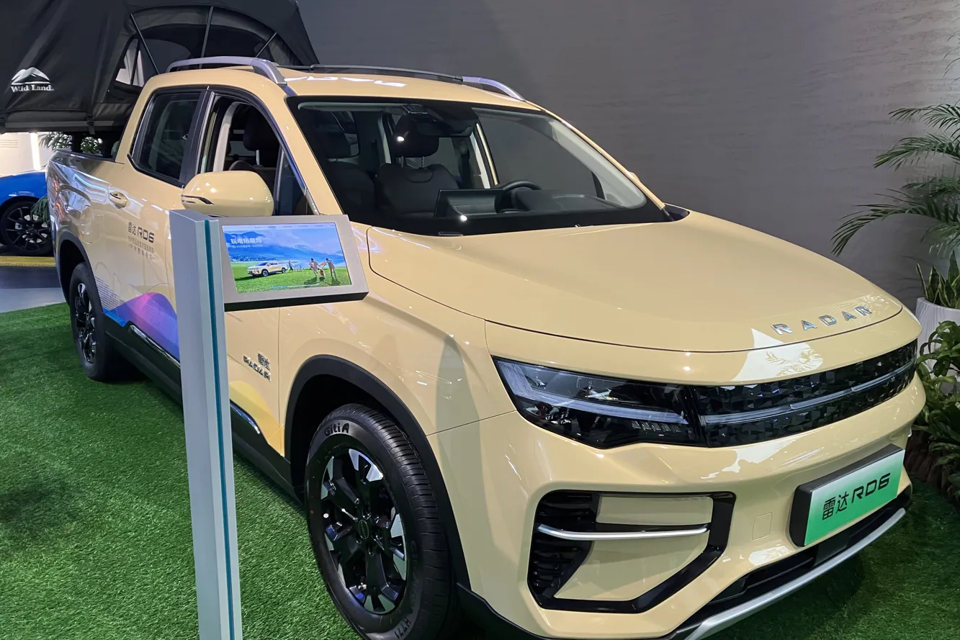
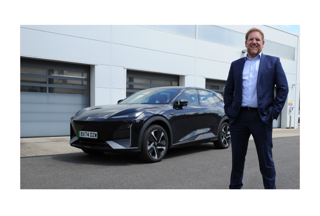
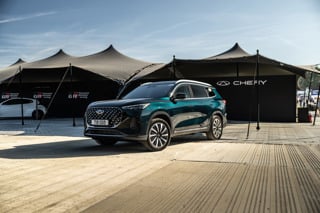
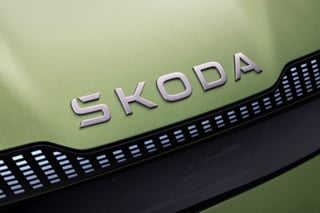

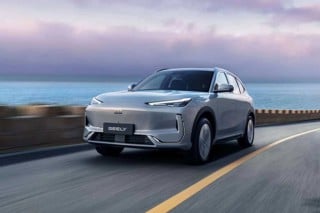











Login to comment
Comments
No comments have been made yet.